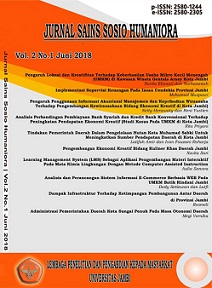PENGUASAAN HAK ATAS TANAH OLEH WARGA NEGARA ASING BERLANDASKAN PERJANJIAN PINJAM NAMA
DOI:
https://doi.org/10.22437/jssh.v7i1.25243Abstract
In a country, land is regarded as an integral part of human life. Land becomes one of the essential things needed to sustain their livelihoods as humans require housing or a place to reside. As time goes by and their living needs evolve, humans not only utilize land as a place to live but also see it as an investment due to its high economic value. This situation leads to an increasing land price each year as more individuals require it. Such land-related investments attract foreign nationals to visit or settle in Indonesia for a certain period to balance their investments in the country. To facilitate this, the government establishes legal provisions for foreign nationals with connections to land in Indonesia through various regulations, particularly the Agrarian Law as the legal framework. In reality, many buying and selling activities are conducted through a borrowing agreement between Indonesian citizens and foreign nationals. Therefore, the purpose of this article is to discuss the rights over land in Indonesia for foreign nationals. According to the Agrarian Law, foreign nationals can possess land in Indonesia through the rights of use and leasehold for buildings. However, in practice, ownership rights (Hak Milik) are also highly coveted by many foreign nationals. Therefore, to fulfill their desires, various covert practices are carried out by foreign nationals through legal circumvention, such as borrowing agreements or nominees with Indonesian citizens.
Downloads
Downloads
Published
Issue
Section
License
Copyright (c) 2023 Muhammad Ibnu Isra, Agus Supriyo

This work is licensed under a Creative Commons Attribution-NonCommercial-ShareAlike 4.0 International License.
-
Copyright and other proprietary rights relating to the article, such as patent rights,
-
The right to use the substance of the article in own future works, including lectures and books,
-
The right to reproduce the article for own purposes,
-
The right to self-archive the article (please read out deposit policy),
-
The right to enter into separate, additional contractual arrangements for the non-exclusive distribution of the article's published version (e.g., post it to an institutional repository or publish it in a book), with an acknowledgment of its initial publication in this jurnal sains sosio humaniora.







